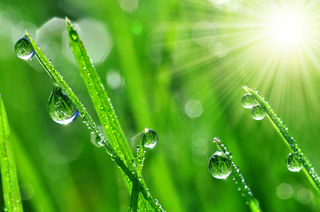Late-Night Smartphone Use Often Fuels Daytime Somnambulism
Late-Night Smartphone Use Often Fuels Daytime Somnambulism
Late-night screen time can disrupt sleep and lead to subpar daytime performance.
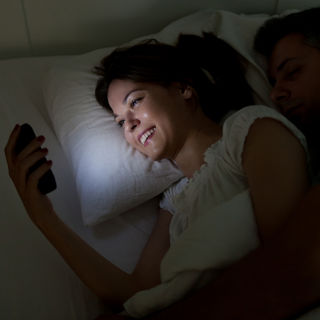
Source: Ana Blazic Pavlovic/Shutterstock
What Is Sleep Hygiene?
Sleep hygiene is defined as, "habits and practices that are conducive to sleeping well on a regular basis and having full daytime alertness." Historically, poor sleep hygiene has been associated with disrupted circadian rhythms, depression, anxiety, and subpar levels of performance at work and school due to reduced cognitive function and physical coordination caused by sleep debt.Regardless of your age, if you sleep with your smartphone next to your bed without turning off the ringer, odds are that your phone probably wakes you up during the night. Obviously, being woken up randomly by the dings and rings of your mobile phone can make you groggy and somewhat somnambulistic the next day.
On average, Americans use smartphones for about 4.7 hours within a 24-hour period according to a 2015 study by Informate Mobile Intelligence in Seattle. Hopefully, the extensive compilation of empirical findings presented here will educate and motivate people of all ages and walks of life to remain cognizant of your late-night smartphone use.
For this blog post, I’ve compiled a comprehensive review that includes a summary of 8 recent studies by various international researchers who investigated the link between late-night smartphone use, sleep disturbances, and the various consequences of poor sleep hygiene being caused by nighttime use of digital devices and social media.
The research below presents a broad swath of science-based findings from multidisciplinary experts who all seem to agree: Unplugging from your digital devices and limiting smartphone use during the hours you set aside for sleeping is of paramount psychological and chronobiological importance.
"I Reported to Work In the Morning, After an Hour or Two's Sleep, Looking Like a Somnambulist"
While I was researching and writing about the impact of nighttime digital technology use on our daytime state-of-mind this afternoon, I was constantly reminded of the world-renowned American writer, Henry Miller, and his fascination with somnambulism.Before diving into the abundance of potentially dry scientific data below, I wanted to breathe some storytelling life into this blog post on somnambulism by mentioning the vivacious lifestyle and writings of Henry Miller who inspired the concept of this post's title. As the antithesis of daytime somnambulism, Miller was a role model.
As a novelist who frequently made social commentary, Henry Miller wrote metaphorically about somnambulists of the modern work-a-day world sleepwalking through life. He used the word somnambulist to describe dispirited characters who were going through life in a half awake, zombie-like daze.
For example, in A Devil in Paradise Miller writes, “Often I took a seat on a public bench, closed my eyes for a few moments to sink below the surface, then suddenly opened them to look at the world with the vacant stare of a somnambulist.” In the semi-autobiographical novel Sexus, Miller writes, “I reported to work in the morning, after an hour or two’s sleep, looking like a somnambulist. The day passed like a dream.”
However, in his personal day-to-day life, Henry Miller was notorious for his passion for bicycle racing and pushing against his limits as summed up in his mantra “Life is 440 horsepower in a 2-cylinder engine.” This approach to life echoes a similar type of moxie Maya Angelou expressed when she wrote, "Life likes to be taken by the lapel and told, 'I'm with you kid. Let's go!'"
Miller aspired to live a zestful life by keeping all of his senses fully engaged and encouraged others to do the same. His joie de vivre is summed up in many of his famous quotations about living life to the fullest—with your eyes, ears, mind, and body wide open to the sense of wonder and awe that can be found in the digital-free world around you.
Three Quotations by Henry Miller that Reiterate the Importance of Avoiding Daytime Somnambulism
“The moment one gives close attention to any thing, even a blade of grass, it becomes a mysterious, awesome, indescribably magnificent world in itself.”Source: Vaclav Volrab/Shutterstock
“The aim of life is to live, and to live means to be aware, joyously, drunkenly, serenely, divinely aware.”
“Develop interest in life as you see it; in people, things, literature, music—the world is so rich, simply throbbing with rich treasures, beautiful souls and interesting people. Forget yourself.”
Hopefully, something you read in one of the eight studies listed numerically below will motivate you to modify your nighttime smartphone habits and help you become more invigorated and tuned-in to the world around you during the day.
1. Global Media Study Challenged College Students to Go Without Using a Smartphone for 24 Hours
Recently, the International Center for Media & the Public Agenda (ICMPA) in partnership with the Salzburg Academy on Media & Global Change conducted a survey of college students around the world to identify how ‘addicted’ they were to smartphone use. The researchers assessed this 'addiction' by asking the students to ‘unplug’ and go for 24 hours without the use of their mobile phones or other digital devices.The study concluded, “Students around the world reported that being tethered to digital technology 24/7 is not just a habit, it is essential to the way they construct and manage their friendships and social lives.”
Although most students around the world saw multiple benefits of going unplugged, their negative reactions to being unplugged from their digital devices for a full day was overwhelming. That being said, there was a sliver of students the researchers referred to as ‘Transcendentalists-in-the-making’ because they were able to revert to ‘simple pleasures’ and found peace of mind when they gave up all media for 24 hours.
2. Higher Daily Averages of Smartphone Use Are Associated with Lower Sleep Quality
A November 2016 study by Matthew Christensen from the University of California, San Francisco (UCSF) and colleagues reported that nighttime exposure to smartphone screens is associated with lower sleep quality. The research team found that smartphone use within 60 minutes of bedtime had the greatest impact on sleep disturbances. The findings were published in the open-access journal PLOS ONE.Christensen and his team analyzed smartphone data use from 653 adult individuals across the United States who were participating in the Health eHeart Study. They also recorded participants number of sleeping hours and sleep quality.
On average, the researchers found that each participant activated his or her smartphone for a total of about 4 minutes every 60 minutes within a 24-hour period. Across the board, longer quantities of daily screen-time use was associated with poor sleep quality and less sleep overall—particularly when smartphones were used near or after participants' bedtime.
3. Nighttime Smartphone Use Drains Workers' Daytime Energy
Using a smartphone to cram in more work late at night can backfire by resulting in significantly less work productivity the next day, according to business scholars from Michigan State University (MSU). The researchers state, "Our findings suggest that late night use of smartphones for work may interfere with sleep, thus leaving employees depleted in the morning and less engaged during the workday.”This 2014 study, “Beginning the Workday Yet Already Depleted? Consequences of Late-Night Smartphone Use and Sleep," was published in the journal Organizational Behavior and Human Decision Processes.
This research consisted of two studies in which Russell Johnson and colleagues at MSU surveyed a broad spectrum of U.S. workers including people who closely monitor their smartphones for business purposes after 9 p.m. Not surprisingly, these workers were more tired and less engaged the following day on the job than their peers who unplugged for the night.
In a statement to MSU, Johnson said, "Smartphones are almost perfectly designed to disrupt sleep. Because they keep us mentally engaged late into the evening, they make it hard to detach from work so we can relax and fall asleep."
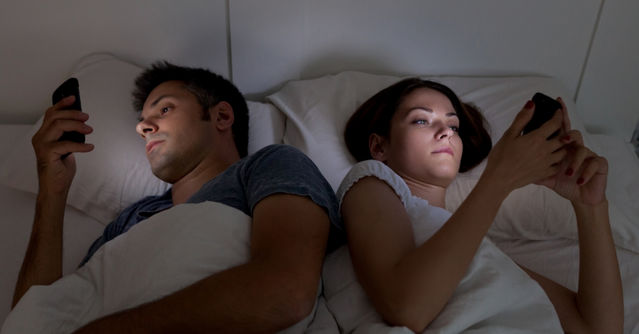
Source: Ana Blazic Pavlovic/Shutterstock
In addition to keeping people mentally engaged at night, smartphones emit "blue light" that seems to be the most disruptive color of light for our circadian rhythms. Blue light is known to hinder melatonin, a chemical in the body that promotes sleep. Based on these dual findings, Johnson concluded,
"So it can be a double-edged sword. The nighttime use of smartphones appears to have both psychological and physiological effects on people's ability to sleep and on sleep's essential recovery functions."
4. One in Five Teenagers Wake Up During the Night to Check Social Media
A January 2017 study by researchers in the UK found that approximately one in five young people wake up during the night to send or check messages on their social media accounts. This study, “Sleepless in school? The Social Dimensions of Young People’s Bedtime Rest and Routines,” was published online in the Journal of Youth Studies.The researchers found that late-night social media engagement is making about 20 percent of teenagers three times more likely to feel constantly tired at school. This type of daytime somnambulism could be affecting these students’ academic performance, happiness, and well-being, according to the researchers.
Notably, students who woke up to use social media almost every night of the week said they were always tired at school and were significantly less happy on average than young people with better sleep hygiene who did not feel sleep deprived at school.
5. Social Media Use by Young Adults Is Associated With Sleep Disturbance
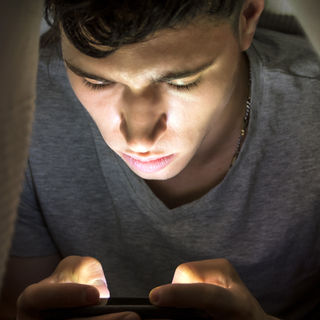
Source: Stefano Cavoretto/Shutterstock
For this study, the researchers sampled 1,788 U.S. adults ages 19 through 32, using questionnaires to determine social media use and a previously established measurement to assess sleep disturbances.
The questionnaires asked each individual about his or her use of the 11 most popular social media platforms at the time: Facebook, YouTube, Twitter, Google Plus, Instagram, Snapchat, Reddit, Tumblr, Pinterest, Vine and LinkedIn. On average, the participants used social media for a total of 61 minutes per day and visited various social media accounts 30 times per week. The assessment showed that nearly 30 percent of the participants had high levels of sleep disturbance.
In a finding that corroborates the UK study above, the respondents who reported most frequently checking social media throughout the week also had three times the likelihood of sleep disturbances, compared with those who checked social media least frequently.
The researchers point out that people who have difficulty sleeping may oftentimes use smartphones and social media as an entertaining way to pass the time when they can't fall asleep or fall back to sleep. Again, due to the impact of "blue light" and other types of stimulation using a smartphone as an insomnia aid often backfires.
The Pitt researchers concluded that their findings (along with the findings of other researchers in the field) should galvanize primary care physicians to consider asking patients about social media habits when assessing sleep issues.
6. Teenagers Who Own Smartphones Spend More Time Online
Another 2015 study from the University of Basel also reported that teenagers' smartphone use during the night is associated with an increased risk of sleep problems and depressive symptoms. The researchers found that only 17 percent of smartphone owners turned their devices off—or put their devices on silent mode—when they were in bed.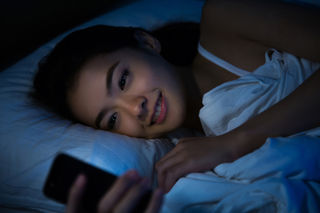
Source: TORWAISTUDIO/Shutterstock
From a public health perspective, the worst news from this study was that teenagers who used smartphones at night had an increased risk for poor sleep hygiene and depressive symptoms.
Therefore, sleep experts recommend that teenagers—who suffer from sleep disturbances and subsequent daytime drowsiness—should be encouraged by parents, coaches, or other influencers to turn off all of their digital media devices and discontinue use at least one hour before bedtime.
7. Texting After Bedtime Impacts School Performance in Adolescents
A January 2016 study, from Rutgers University, found that texting at night affects both teens' sleep and their academic performance. In fact, students who turned off their digital devices or text messaged for less than 30 minutes after lights out, performed significantly better in school than those who messaged for more than 30 minutes after lights out.This 2016 Rutgers study was the first of its kind to link nighttime texting habits of American teenagers with sleep hygiene and academic performance.
The researchers found that students who texted longer in the dark slept fewer hours and were more tired during the day than those who stopped messaging and turned off their phones when they went to bed. This is common sense, but it's nice to have empirical evidence to back up something most of us have probably realized from our own life experience.
In a statement to Rutgers, study author Xue Ming, professor of neuroscience and neurology at Rutgers New Jersey Medical School, said,
"During the last few years I have noticed an increased use of smartphones by my patients with sleep problems. I wanted to isolate how messaging alone—especially after the lights are out—contributes to sleep-related problems and academic performance.Ming suggests that educators recognize the sleep needs of teenagers and incorporate sleep education into their curriculum. Ming said, "Sleep is not a luxury; it's a biological necessity. Adolescents are not receiving the optimal amount of sleep; they should be getting 8-and-a-half hours a night." Adding, "Sleep deprivation is a strong argument in favor of later start times for high schools—like 9 a.m."
When we turn the lights off, it should be to make a gradual transition from wakefulness to sleep. If a person keeps getting text messages with alerts and light emission, that also can disrupt his circadian rhythm. Rapid Eye Movement (REM) sleep is the period during sleep most important to learning, memory consolidation and social adjustment in adolescents. When falling asleep is delayed but rising time is not, REM sleep will be cut short, which can affect learning and memory.
We need to be aware that teenagers are using electronic devices excessively and have a unique physiology. They tend to go to sleep late and get up late. When we go against that natural rhythm, students become less efficient."
8. Feeling Pressure to Be available 24/7 on Social Media Is Linked to Teenage Sleep Disturbances, Anxiety, and Depression
The need to be available 24/7 on social media can be a prime driving force that reduces sleep quality and often leads to depression and free-floating anxiety according to recent research conducted by Heather Cleland Woods and Holly Scott from the University of Glasgow.For this study, the researchers created a questionnaire for 467 teenagers regarding their overall and night-time specific use of social media. Another set of tests were designed to measure sleep quality, self-esteem, anxiety, and depression. They also measured emotional investment in social media which can increase the feeling of obligation to respond immediately to texts and social media posts around the clock.
Both daytime and nighttime specific social media use—along with the emotional investment in staying plugged into their digital devices—was correlated with poorer sleep quality, lower self-esteem as well as higher anxiety and depression levels, the researchers concluded.
In a statement to the British Psychological Association, Cleland Woods explained:
"Adolescence can be a period of increased vulnerability for the onset of depression and anxiety, and poor sleep quality may contribute to this. It is important that we understand how social media use relates to these. Evidence is increasingly supporting a link between social media use and wellbeing, particularly during adolescence, but the causes of this are unclear.The need to be constantly available and respond 24/7 on social media can cause depression, anxiety, and reduce sleep quality for teenagers and people of all ages, according to this study and other research.
While overall social media use impacts on sleep quality, those who log on at night appear to be particularly affected. This may be mostly true of individuals who are highly emotionally invested. This means we have to think about how our kids use social media, in relation to time for switching off."
Smartphones Are Disrupting Circadian Rhythms Around the World: Experts Recommend Turning Off Your Smartphone One Hour Before Going to Bed
The data from these studies reaffirms that whether or not you're a teenager, excessive nighttime texting or smartphone use may be to blame for reduced cognitive performance and feeling lethargic during the day.In the decade since its invention in 2007, smartphones are rapidly disrupting sleep patterns that evolved over millennia for people around the globe. Experts strongly recommend that teenagers (and adults) who suffer from any type of sleep disorders or severe daytime tiredness should turn off all of their digital media devices at least one hour before bedtime.
Humans have evolved to spend roughly one-third of our lifetime sleeping. Ideally, you should sleep about 8 hours for every 16 hours of wakefulness, which adds up to 122 days of sleep per year.
Your mind, body, and brain will function optimally at a basic two-to-one ratio of wake-to-sleep. Based on this equation, by the time you're sixty years old, this would add up to twenty years spent sleeping, and about five solid years in REM sleep.
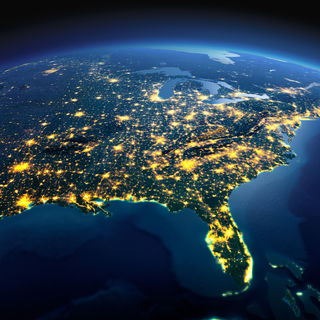
Source: Anton Balazh/Shutterstock
Everybody has an internal biological clock that dictates the circadian rhythms and the fluctuations within your body based on our planet's 24-hour day. Circadian rhythms are controlled by a grain-of-rice-sized cluster of 20,000 neurons behind the eyes called the Suprachiasmatic nucleus (SCN). The SCN is regulated by how much light, particularly natural sunlight, is taken in by specific cells in the retina.
In 2013, researchers at MIT reported that when circadian rhythm are thrown off—health problems including obesity and metabolic disorders such as diabetes can arise.
However, digital technologies—along with light pollution caused by global trends of urbanization—are playing an even bigger role in disrupting our natural sleep patterns in the smartphone era than most experts anticipated. In fact, researchers reported in June 2016 that due to artificial lights, one-third of humanity (and 80 percent of Americans) can no longer see the Milky Way at night.
In a perfect world, the consensus of most experts is to turn off your smartphone (and all other digital devices) one hour before bedtime to minimize the "blue light" exposure to your SCN which disrupts circadian rhythms and sleep patterns. Sleep experts also recommend using a traditional alarm clock and charging your phone overnight outside of the bedroom.
Although unplugging from our smartphones takes some willpower for most of us, any effort you make to minimize screen exposure before and during bedtime hours will help reduce sleep disturbances and subsequent consequences of poor sleep hygiene such as daytime somnambulism.

